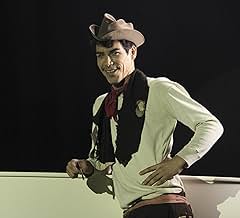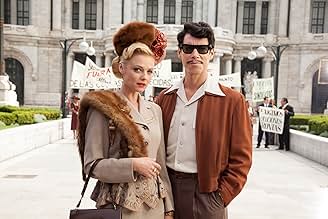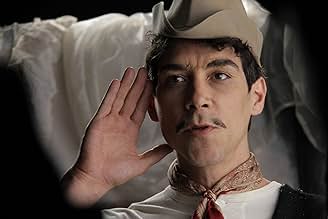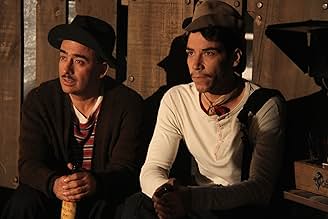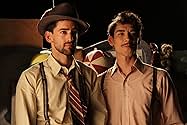IMDb RATING
6.6/10
4.3K
YOUR RATING
The untold story of Mexico's greatest and most beloved comedy film star of all time, from his humble origins on the small stage to the bright lights of Hollywood.The untold story of Mexico's greatest and most beloved comedy film star of all time, from his humble origins on the small stage to the bright lights of Hollywood.The untold story of Mexico's greatest and most beloved comedy film star of all time, from his humble origins on the small stage to the bright lights of Hollywood.
- Director
- Writers
- Stars
- Awards
- 30 wins & 11 nominations total
Arantza Muñoz
- Bailarina
- (as Aranzta Muñoz)
Armando Vega Gil
- Músico Salón
- (as Armando Vega-Gil)
- Director
- Writers
- All cast & crew
- Production, box office & more at IMDbPro
Featured reviews
Cantinflas (2014) should have been a clever little gem about a piece of forgotten film history but ends up being a solidly boring mish-mesh of a film that did little justice to its subject matter. In it Cantinflas aka Mario Moreno (Oscar Jaenada) works his way up from a minor vaudeville player on the streets of Mexico City to one of the most beloved Mexican actor/comedians of all time.
He does so while a second, mostly English tale unfolds. Michael Todd (Michael Imperioli) a wily producer at United Artists is trying to cobble together the 1956 theatrical version of Around the World in 80 Days. He boasts to the studio exec that he can convince over forty international film stars to be in the film but in reality he barely has Elizabeth Taylor on the hook. In an attempt to make the film salvageable he asks the ever-popular Cantinflas to make a cameo appearance.
Despite polished period detail and some worthwhile performances, Cantinflas feels cheap and more than a bit off. The cinematography colludes into a mix of flat browns and grays and everyone seems to be spotted by florescent lights. One cannot help but wonder if this story was given to a more mature director we'd be able to see and enjoy the vibrant colors of Mexico and the luster of old Hollywood.
The film is also betrayed by a script that fails to staple the important moments or rather the two largest threads into a story of urgency. The turbulent labor politics of Moreno's time get the same compromised treatment as his early roving theatre career. His height of popularity is as deflated as the 80 Days subplot. It's as if the editors lost a few key scenes on the cutting room floor and pasted half-shot scenes together hoping the audience wouldn't notice.
There's one nearly-poignant scene where Cantinflas, in a "success is ruination"-type stupor sees a note of encouragement by none other than Charlie Chaplin. Again I say near-poignant because up until that moment we never knew Chaplin's opinion was important to Cantinflas. Goaded by the letter, once Cantinflas agrees to do Around the World in 80 Days it leaves him without catharsis or character change. His wife seemed to think fame was going to his head so appearing in the film he's most internationally recognized for wouldn't have solved that dispute; yet it did.
Cantinflas attempts to create a stereotypical biographical film out of a figure that, given the events of the film, deserved better. At best this film deserves to be on cable and given a Hallmark type release, not a theatrical one. Maybe in the decades to come people will honor his contribution to his nation's cinema with a movie that immortalizes the man properly. Now that would be the rub.
http://www.theyservepopcorninhell.blogspot.com
He does so while a second, mostly English tale unfolds. Michael Todd (Michael Imperioli) a wily producer at United Artists is trying to cobble together the 1956 theatrical version of Around the World in 80 Days. He boasts to the studio exec that he can convince over forty international film stars to be in the film but in reality he barely has Elizabeth Taylor on the hook. In an attempt to make the film salvageable he asks the ever-popular Cantinflas to make a cameo appearance.
Despite polished period detail and some worthwhile performances, Cantinflas feels cheap and more than a bit off. The cinematography colludes into a mix of flat browns and grays and everyone seems to be spotted by florescent lights. One cannot help but wonder if this story was given to a more mature director we'd be able to see and enjoy the vibrant colors of Mexico and the luster of old Hollywood.
The film is also betrayed by a script that fails to staple the important moments or rather the two largest threads into a story of urgency. The turbulent labor politics of Moreno's time get the same compromised treatment as his early roving theatre career. His height of popularity is as deflated as the 80 Days subplot. It's as if the editors lost a few key scenes on the cutting room floor and pasted half-shot scenes together hoping the audience wouldn't notice.
There's one nearly-poignant scene where Cantinflas, in a "success is ruination"-type stupor sees a note of encouragement by none other than Charlie Chaplin. Again I say near-poignant because up until that moment we never knew Chaplin's opinion was important to Cantinflas. Goaded by the letter, once Cantinflas agrees to do Around the World in 80 Days it leaves him without catharsis or character change. His wife seemed to think fame was going to his head so appearing in the film he's most internationally recognized for wouldn't have solved that dispute; yet it did.
Cantinflas attempts to create a stereotypical biographical film out of a figure that, given the events of the film, deserved better. At best this film deserves to be on cable and given a Hallmark type release, not a theatrical one. Maybe in the decades to come people will honor his contribution to his nation's cinema with a movie that immortalizes the man properly. Now that would be the rub.
http://www.theyservepopcorninhell.blogspot.com
I've seen the movie "Cantinflas" directed by Sebastian del Amo, and I am convinced that this is "the film that every Mexican must-see". This is biopic is the story of Mexico's greatest and most beloved comedy film star of all time, Mario Moreno "Cantinflas". The film follows him from his humble beginnings on the small stage to the bright lights of Hollywood.
On one side you discover the man: Mario Moreno who expressed his values through his Cantinflas character on films and stage. Cantinflas gives voice to social issues: on his films he would protest against injustice, keeping his cool being sincere, generous, honest and optimistic. Cantinflas never resorted to vulgarity, nor to profanity, insults or violence to make us laugh, and his unique speech style (cantinflear) reflects the demagogic rhetoric we hear from politicians. We all recognize on Mario Moreno "Cantinflas" a Mexican hero who overcame poverty and lack of formal education to become an artist and humanist, recognized worldwide.
On the other hand, there is the film where actor Oscar Jaenada does a masterful "incarnation" of Mario Moreno Cantinflas. Thanks to Oscar's credibility and this film's quality production, more people attended movie theaters to watch the movie and a new generations will better understand Cantinflas legacy and values.
In addition, the performances of other actors like Ilse Salas, Barbara Mori, Gabriela de la Garza and Luis Gerardo Méndez, to name a few, were preceded by months of preparation and are really a tribute to the characters they play. Original music by Aleks Syntek. Screen play by Edui Tijerina, and excellent production of entrepreneurs Vidal Garza Cantú, Adolfo Franco, Alejandro Barron, and Mario Moreno Ivanova. Thus, "Cantinflas" brings to life Mexico's hero, so this is a most- see film for everyone in Mexico, and elsewhere.
On one side you discover the man: Mario Moreno who expressed his values through his Cantinflas character on films and stage. Cantinflas gives voice to social issues: on his films he would protest against injustice, keeping his cool being sincere, generous, honest and optimistic. Cantinflas never resorted to vulgarity, nor to profanity, insults or violence to make us laugh, and his unique speech style (cantinflear) reflects the demagogic rhetoric we hear from politicians. We all recognize on Mario Moreno "Cantinflas" a Mexican hero who overcame poverty and lack of formal education to become an artist and humanist, recognized worldwide.
On the other hand, there is the film where actor Oscar Jaenada does a masterful "incarnation" of Mario Moreno Cantinflas. Thanks to Oscar's credibility and this film's quality production, more people attended movie theaters to watch the movie and a new generations will better understand Cantinflas legacy and values.
In addition, the performances of other actors like Ilse Salas, Barbara Mori, Gabriela de la Garza and Luis Gerardo Méndez, to name a few, were preceded by months of preparation and are really a tribute to the characters they play. Original music by Aleks Syntek. Screen play by Edui Tijerina, and excellent production of entrepreneurs Vidal Garza Cantú, Adolfo Franco, Alejandro Barron, and Mario Moreno Ivanova. Thus, "Cantinflas" brings to life Mexico's hero, so this is a most- see film for everyone in Mexico, and elsewhere.
This is a Mexican/Spanish co-production dealing with the untold story of Mexico's greatest and most beloved comedy film star of all time, Cantinflas (Oscar Jaenada) , from his poor origins on the small stage and his acting in Mexican cinema to the bright lights of Hollywood , being hired by a powerful US producer , Mike Todd (Michael Imperioli) .In his youth, he earned money as a prizefighter and worked as an acrobat in circus tent shows. As he acted in cabarets , theatres and varietee shows . He was married to Valentina Ivanova (Ilse Salas) from 1936 until her death. He appeared in more than 55 films, including as Passepartoute in his biggest hit : Around the world in 80 days (1956) . At the peak of his career in the late 1950s, Cantinflas was earning more than $1.5 million a year and was referred to in press releases as the world's highest-paid comedian. He once described as "the world's greatest comedian" by none other than Charles Chaplin (Sedgwick) .Despite the fact that Cantinflas died a millionaire several times over, and was one of the biggest stars ever in Spanish language films, he never forgot where he came from. Much of his money was given over to charitable work, including high-quality, low-income housing for Mexico City's poor. When he died, he was hailed as a national hero, and a protracted period of official mourning followed.
The picture describes various episodes about Cantinflas life from Mexico to around the world , many of them shown in flashbacks , his hard beginings , his relationship to his understanding wife Valentina Ivanova ( Ilse Salas) , the stubborn Mike Todd (who married Liz Taylor played Barbara Mori) to hire him , the Actors Unions strike led by Cantinflas himself with appearance of notorious Mexican actors as Dolores Del Rio (Jessica Gocha) , María Félix (Ximena Gonzalez-Rubio) , Jorge Negrete (Julio Bracho) , Miroslava , Gloria Marin (Giovanna Zacarias) , Ernesto Alonso , Lupita Tovar (Flor Payán) , Pedro Armendariz , Emilio Indio Fernández (Joaquin Cosio) , cameraman Gabriel Figueroa (Carlos Aragón) , among others . In addition , here shows up some prestigious Hollywood actors in brief appearances , such as : Kirk Douglas (Juan Castelazo) , Charlie Chaplin (Julian Sedgwick) , Marlene Dietrich (Karin Burnett) , Marlon Brando ,Yul Brynner , and Liz Taylor . Furthermore , showing the shooting in the Churubusco studios of some Cantinflas films as ¨Ahí esta el detalle¨, ¨Ni sangre ni arena¨, ¨El gendarme desconocido¨, ¨Un dia con el diablo¨ and , of course , ¨Around the world in 80 days¨ . Stars Oscar Jaenada who looks exactly him , he gives an acceptable acting as the famous showman . However , this film was not well received in México, due to the decission of giving the role to a spanish actor. The general sense is that even when the acting was good, Jaenada was not capable to be funny, because he couldn't understand the mexican sense of humor. There's no real consensus on how Mario Moreno Reyes adopted his more familiar professional name. One story goes that he did not want to shame his family, who thought of show business as a less than respectable profession, and so created his name. Another is that, at one of his first nightclub engagements, a heckler taunted him with, "¡En la cantina inflas!" ("You get drunk in the bar room!"). Other stories say the name came from phrases like "¡Cuanto inflas!", (you really get drunk!) "¿Cantas o le inflas?" (you sing or get drunk?), or "ya calláte cantinflas" (shut up, cheap singer) For some reason, this amused him, and he shortened the taunt into the professional name of Cantinflas. In 1936 Cantinflas made his first "film," a two-reel advertisement for a trucking company. A year later, he appeared in his first movie for the nascent Mexican film industry, "Asi Es Mi Tierra" ("That's My Country"). He scored his first international success in 1940 with what also was his first full-length feature, "Ahi Esta el Detalle" ("There Is the Detail"). In his second major film, "Ni Sangre, Ni Arena" ("Neither Blood Nor Sand"), Cantinflas plays dual roles - an arrogant matador and a humble, devoted fan. The comedy begins when, through a classic mix-up of identities, the lowly fan is mistaken for the vain bull fighter. Cantinflas was to perfect the bull-fight into one of his most famous routines, performed again and again in arenas in Mexico, Europe and the United States.
The movie has enough budget , including big production design , fastuous scenarios , and luxurious sets . As well as a colorful and brilliant cinematography by Carlos Hidalgo . It contains an evocative and atmospheric musical score by Roque Baños . The motion picture was professionally directed by Sebastian del Amo who plays a cameo as Yul Brynner . It had a great world wide premiere in Mexico D.F. and it was Official submission of Mexico to the best foreign language film category of the 87th Academy Awards 2015. In Spain was released in 2016, 2 years later, in 36 theaters and thanks to Óscar Jaenada who personally secured it a Spanish released trough his connections, which ended up happening on April the 15th 2016.
The picture describes various episodes about Cantinflas life from Mexico to around the world , many of them shown in flashbacks , his hard beginings , his relationship to his understanding wife Valentina Ivanova ( Ilse Salas) , the stubborn Mike Todd (who married Liz Taylor played Barbara Mori) to hire him , the Actors Unions strike led by Cantinflas himself with appearance of notorious Mexican actors as Dolores Del Rio (Jessica Gocha) , María Félix (Ximena Gonzalez-Rubio) , Jorge Negrete (Julio Bracho) , Miroslava , Gloria Marin (Giovanna Zacarias) , Ernesto Alonso , Lupita Tovar (Flor Payán) , Pedro Armendariz , Emilio Indio Fernández (Joaquin Cosio) , cameraman Gabriel Figueroa (Carlos Aragón) , among others . In addition , here shows up some prestigious Hollywood actors in brief appearances , such as : Kirk Douglas (Juan Castelazo) , Charlie Chaplin (Julian Sedgwick) , Marlene Dietrich (Karin Burnett) , Marlon Brando ,Yul Brynner , and Liz Taylor . Furthermore , showing the shooting in the Churubusco studios of some Cantinflas films as ¨Ahí esta el detalle¨, ¨Ni sangre ni arena¨, ¨El gendarme desconocido¨, ¨Un dia con el diablo¨ and , of course , ¨Around the world in 80 days¨ . Stars Oscar Jaenada who looks exactly him , he gives an acceptable acting as the famous showman . However , this film was not well received in México, due to the decission of giving the role to a spanish actor. The general sense is that even when the acting was good, Jaenada was not capable to be funny, because he couldn't understand the mexican sense of humor. There's no real consensus on how Mario Moreno Reyes adopted his more familiar professional name. One story goes that he did not want to shame his family, who thought of show business as a less than respectable profession, and so created his name. Another is that, at one of his first nightclub engagements, a heckler taunted him with, "¡En la cantina inflas!" ("You get drunk in the bar room!"). Other stories say the name came from phrases like "¡Cuanto inflas!", (you really get drunk!) "¿Cantas o le inflas?" (you sing or get drunk?), or "ya calláte cantinflas" (shut up, cheap singer) For some reason, this amused him, and he shortened the taunt into the professional name of Cantinflas. In 1936 Cantinflas made his first "film," a two-reel advertisement for a trucking company. A year later, he appeared in his first movie for the nascent Mexican film industry, "Asi Es Mi Tierra" ("That's My Country"). He scored his first international success in 1940 with what also was his first full-length feature, "Ahi Esta el Detalle" ("There Is the Detail"). In his second major film, "Ni Sangre, Ni Arena" ("Neither Blood Nor Sand"), Cantinflas plays dual roles - an arrogant matador and a humble, devoted fan. The comedy begins when, through a classic mix-up of identities, the lowly fan is mistaken for the vain bull fighter. Cantinflas was to perfect the bull-fight into one of his most famous routines, performed again and again in arenas in Mexico, Europe and the United States.
The movie has enough budget , including big production design , fastuous scenarios , and luxurious sets . As well as a colorful and brilliant cinematography by Carlos Hidalgo . It contains an evocative and atmospheric musical score by Roque Baños . The motion picture was professionally directed by Sebastian del Amo who plays a cameo as Yul Brynner . It had a great world wide premiere in Mexico D.F. and it was Official submission of Mexico to the best foreign language film category of the 87th Academy Awards 2015. In Spain was released in 2016, 2 years later, in 36 theaters and thanks to Óscar Jaenada who personally secured it a Spanish released trough his connections, which ended up happening on April the 15th 2016.
Unless you are familiar with the Mexican phenomenon known as Cantinflas, before you watch this new bio-pic, you might just want to see a few of these films first so that you can appreciate their wonderful style and charm. They also might help you to understand why Charlie Chaplin raved about the man who created this character and referred to him as 'the world's greatest comedian' as well as why they've chosen to make a film about his life.
Unfortunately, "Cantinflas" is NOT the perfect film about Mario Moreno's life and career in films. It seems to spend too much energy focusing on his performance in the Hollywood film "Around the World in 80 Days" and not nearly enough on his Mexican movies--which are clearly his best. While his role in "Around the World" did help to bring him to the attention of the American public, his career in Hollywood films would later turn out to be a flop--something that the film not only fails to mention but it strongly implies that his efforts in American cinema were very successful. Likewise, the film tends to whitewash Moreno's personal life at times and fails to show just how beloved the man was in his native land. Despite these flaws, the movie is still well worth seeing. Óscar Jaenada does a lovely job impersonating the late actor and the film is technically a very well made film. It also does a good job in showing the path by which Moreno learned his craft and perfected his Cantinflas character--all things that fans of these films should appreciate and enjoy. It also leaves you wanting to see more--something I'd strongly recommend. You might want to try a few of his later films, such as "The Little Priest", "El Bolero de Raquel", "The Illiterate One" or "Su Exelencia", as they are excellent and, more importantly, are widely available on DVD since they were released by Columbia Pictures, unlike his earlier films.
Incidentally, "Cantinflas" is the official submission for Mexico for the Best Foreign Language Oscar. We'll soon see if it's among the few selected nominees for this award.
Unfortunately, "Cantinflas" is NOT the perfect film about Mario Moreno's life and career in films. It seems to spend too much energy focusing on his performance in the Hollywood film "Around the World in 80 Days" and not nearly enough on his Mexican movies--which are clearly his best. While his role in "Around the World" did help to bring him to the attention of the American public, his career in Hollywood films would later turn out to be a flop--something that the film not only fails to mention but it strongly implies that his efforts in American cinema were very successful. Likewise, the film tends to whitewash Moreno's personal life at times and fails to show just how beloved the man was in his native land. Despite these flaws, the movie is still well worth seeing. Óscar Jaenada does a lovely job impersonating the late actor and the film is technically a very well made film. It also does a good job in showing the path by which Moreno learned his craft and perfected his Cantinflas character--all things that fans of these films should appreciate and enjoy. It also leaves you wanting to see more--something I'd strongly recommend. You might want to try a few of his later films, such as "The Little Priest", "El Bolero de Raquel", "The Illiterate One" or "Su Exelencia", as they are excellent and, more importantly, are widely available on DVD since they were released by Columbia Pictures, unlike his earlier films.
Incidentally, "Cantinflas" is the official submission for Mexico for the Best Foreign Language Oscar. We'll soon see if it's among the few selected nominees for this award.
As much as I love learning about the history of Hollywood, there can be something pretentious about the Hollywood biopic. The story of a great creative mind taking Hollywood by storm is one that's been told too many times and easily falls into repetition. Aside from that, there's always the sneaking suspicion that the screenwriter or director is co-opting his subject's story to wrestle with his own greatness.
"Catinflas" intrigued me enough at the start that I decided to throw caution to the wind hoping the plot wouldn't veer into cliché. I enjoyed seeing the trial and error process over how Catinflas discovered his true calling, I thought the setting was unique (especially the unforgiving Mexican stage where heckling is the norm) and the actor who played Catinflas had a magnetic working-man kind of presence.
The decision to intercut the story of Mario "Catinflas" Morelli's ascension to fame over the years and the trials and tribulation "Around the World in 80 Days" producer Michael Todd to get his film made, also had potential except for the fact Michael Todd seemed like a rather flat character (not to take anything away from Imperioli's performance), and while I enjoyed "Around the World in 80 Days" as a kid, I'm not sure if there's anything to celebrate in Todd's methodology of putting every actor he could find in the film.
The storyline itself is one I've seen a hundred times before, so the film was largely on the shoulders of Oscar Jaenada and to the degree he could, Jaenada did an extraordinary job. If only he had slightly better material to work with.
"Catinflas" intrigued me enough at the start that I decided to throw caution to the wind hoping the plot wouldn't veer into cliché. I enjoyed seeing the trial and error process over how Catinflas discovered his true calling, I thought the setting was unique (especially the unforgiving Mexican stage where heckling is the norm) and the actor who played Catinflas had a magnetic working-man kind of presence.
The decision to intercut the story of Mario "Catinflas" Morelli's ascension to fame over the years and the trials and tribulation "Around the World in 80 Days" producer Michael Todd to get his film made, also had potential except for the fact Michael Todd seemed like a rather flat character (not to take anything away from Imperioli's performance), and while I enjoyed "Around the World in 80 Days" as a kid, I'm not sure if there's anything to celebrate in Todd's methodology of putting every actor he could find in the film.
The storyline itself is one I've seen a hundred times before, so the film was largely on the shoulders of Oscar Jaenada and to the degree he could, Jaenada did an extraordinary job. If only he had slightly better material to work with.
Did you know
- TriviaOfficial submission of Mexico to the best foreign language film category of the 87th Academy Awards 2015.
- GoofsThe scene of shooting "Ahí está el detalle" (1940) begins with a title card indicating that filming takes place at Churubusco Studios. Churubusco facilities weren't opened until 1945. In fact, filming took place at CLASA Studios.
- Crazy creditsWhile the credits role one of the most famous scenes of the film El bolero de Raquel is recreated by the actors in the film.
- ConnectionsFeatures A Trip to the Moon (1902)
- SoundtracksScore 01/ Original Soundtrack - Cantinflas: Música Original De La Película
Composed by Roque Baños (as Roque Baños López)
Universal / Universal Music Latino / Vene
- How long is Cantinflas?Powered by Alexa
Details
- Release date
- Country of origin
- Languages
- Also known as
- 캔틴플라스
- Filming locations
- Teatro de la Ciudad, Mexico City, Mexico(Where Cantinflas and his friends go to a show early in the film.)
- Production company
- See more company credits at IMDbPro
Box office
- Budget
- $3,000,000 (estimated)
- Gross US & Canada
- $6,382,924
- Opening weekend US & Canada
- $2,661,253
- Aug 31, 2014
- Gross worldwide
- $17,998,703
- Runtime
- 1h 42m(102 min)
- Color
Contribute to this page
Suggest an edit or add missing content

![Watch Tráiler [OV]](https://m.media-amazon.com/images/M/MV5BMDJhMDMxOTYtODA3MS00YTQzLWEyODctM2M1Y2FiZjI5YjBkXkEyXkFqcGdeQXRodW1ibmFpbC1pbml0aWFsaXplcg@@._V1_QL75_UX500_CR0)





